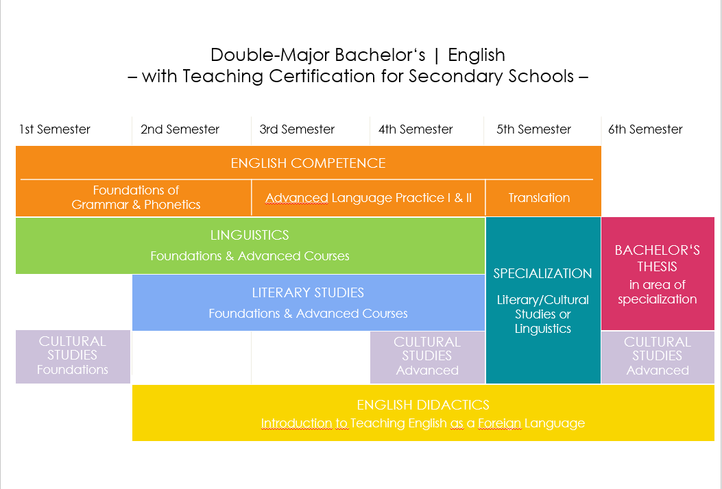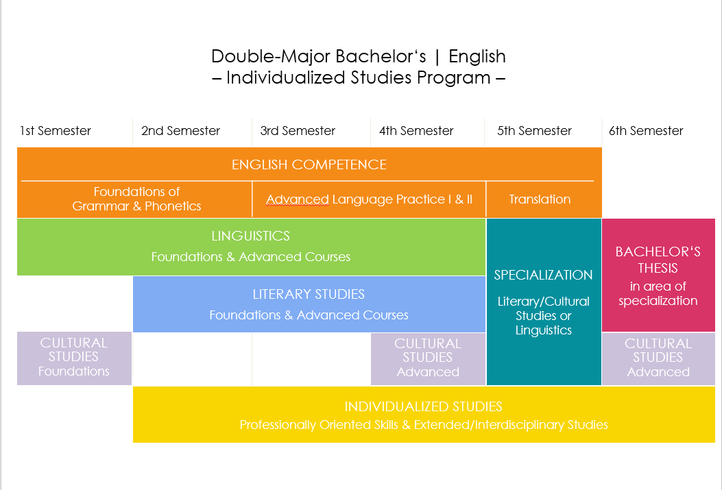Double-Major Bachelor's Degree
At a Glance
Degree program
English – Major (with teaching option)
Start Date
- Winter semester
Application Period
- 1 June – 30 September
- Transfer students
1 June – 30 September / 1 December – 31 March
Entrance Requirements
- First-time students: Proof of language proficiency.
► Please consult the additional information provided under Undergraduate Admissions - Upper-semester students: open admission (from an equivalent field of study)
Length of Program
6 Semesters
Language of Instruction
English
Possible Second Majors
Art, Biology, Catholic Theology, Chemistry, Chinese, Computer Science, Economics, French, Geography, German, Greek, History, Italian, Latin, Mathematics, Music, Philosophy/Ethics, Physics, Political Science, Russian, Spanish, Sport & Sport Studies
Costs
- Students from EU and EEA countries: €155 student activity fee per semester. No tuition fees.
- Tuition fees for students from non-EU/EEA countries or for those pursuing a second undergraduate degree came into effect starting in the 2017/18 Winter Semester. Read more details here.
Object of Study
The major in English and American Studies/Anglistik und Amerikanistik is devoted to the study of the culture, language, and literature of the English-speaking world, from its beginnings up to the present day.
English literary studies uses theoretical and comparative frameworks to deal with the history of English and North American literature, also integrating works from other English-speaking literatures.
English linguistics uses linguistic theories and models to study the English language, its history, and its continuing development. Special focus is laid on British and American English, older historical stages of English (Old and Middle English), as well as other standard and non-standard variants of the language.
British and North American cultural studies investigates the sociocultural backgrounds and nexuses of English-speaking countries and their cultural products, particularly in the context of societal structures. Through its integration of various cultural and academic perspectives, cultural studies takes a deeply interdisciplinary approach. It incorporates insights from literary studies, media studies, linguistics, history, social sciences, film studies, theatre studies, art history, musicology, economics, communications, and the humanities.
In addition, a broad and important part of the Bachelor's program consists in practical language courses. Our goal is to help our students bring their already-impressive English skills up to near-native proficiency.
Content & Structure
Content
The English major offers a wide-ranging undergraduate education focusing on linguistic, literary, and cultural developments in the English-speaking world. Alongside intercultural and near-native communicative competence (spoken and written), you'll develop a deeper understanding of the structure and various uses of the English language, and will familiarise yourself with the basics of linguistics (syntax, morphology, semantics, pragmatics, phonology, phonetics, and corpus linguistics) as well as applied language studies (e.g. language acquisition and teaching, psycholinguistics, sociolinguistics). You will develop a general understanding of English and North American literature, and of its historical and cultural background(s). Through your work with literary and cultural-studies frameworks (literary history, cultural theory, narratology, media studies), you'll expand your ability to analyse literary and non-literary texts. Furthermore, you'll gain special expertise either in linguistics, literary studies, or cultural studies, and learn to develop and present sound academic arguments.
Structure
The English program is structured as a series of modules. Each module is a teaching and learning unit, composed of required and elective courses with similar content and/or themes. The major in English and American Studies requires 75 ECTS points. During your studies, you'll choose courses in the following subjects:
- Foundations of Linguistics
- Foundations of Literary Studies
- Foundations of Cultural Studies
- Advanced Linguistics
- Advanced Literary Studies
- Advanced Cultural Studies
- Specialisation in Linguistics or Literary/Cultural Studies
- English Competence
- Foundations of Grammar and Phonetics
- Advanced Language Practice
- Translation
Please refer also to the information from Freiburg's School of Education, Freiburg Advanced Center of Education (FACE).
Academic Program and Degree Plan (Prüfungsordnung & Studienverlaufsplan)
- General Guidelines for the Polyvalent Double-Major Bachelor's Degree (PDF in German Only)
- Academic program (PDF in German only)
- Degree plan (PDF in German only)
- Option: Secondary teaching certification (PDF in German only)
- Option: Self-designed studies (PDF in German only)
Study Programs – Graphics


General Information
The polyvalent double-major Bachelor's degree is designed as a full-time course of studies and consists of two majors (75 ECTS each), a self-designed component (20 ECTS) and a bachelor's thesis in one of the two majors (10 ECTS). The self-defined component can be individually shaped, either as an optional secondary teaching certification or through the pursuit of other academic interests. Alternatively, students can complete both self-defined components and decide at the end of their studies which component should count. In that case, ECTS points earned as part of the other component are forfeited.
The double-major B.A. with a major in English is one of the best-established Humanities programs at the University of Freiburg, and allows its students to complete a streamlined, well-organised degree in English language, literature, and culture in a comparatively short time. Furthermore, the program is distinguished by an optimal student-to-faculty ratio, leading to generally small course sizes–ideal conditions for focused studies. Of particular note is the program's practical relevance, ensured by professional skills courses (berufsfeldorientierte Kompetenzen, BOK) in the general education component, as well as the possibility of for-credit internships as part of the major.
ECTS
The European Credit Transfer and Accumulation System (ECTS) is a standard for measuring the expected workload that's necessary for students to successfully meet learning outcomes. For successfully completed studies, ECTS credits are awarded. 1 ECTS point represents 30 hours of work, and each student should spend 1200 hours/yr for their major and 400 for the minor. The ECTS is designed to make the structure of tertiary education, as well as its associated workload, more transparent. Through the accumulation of ECTS points, the system simplifies the documentation of each student's progress.
Financial Aid and Stipendia
Please consult the information provided by the Student Service Center as well as the SWFR (under the header "Money").

